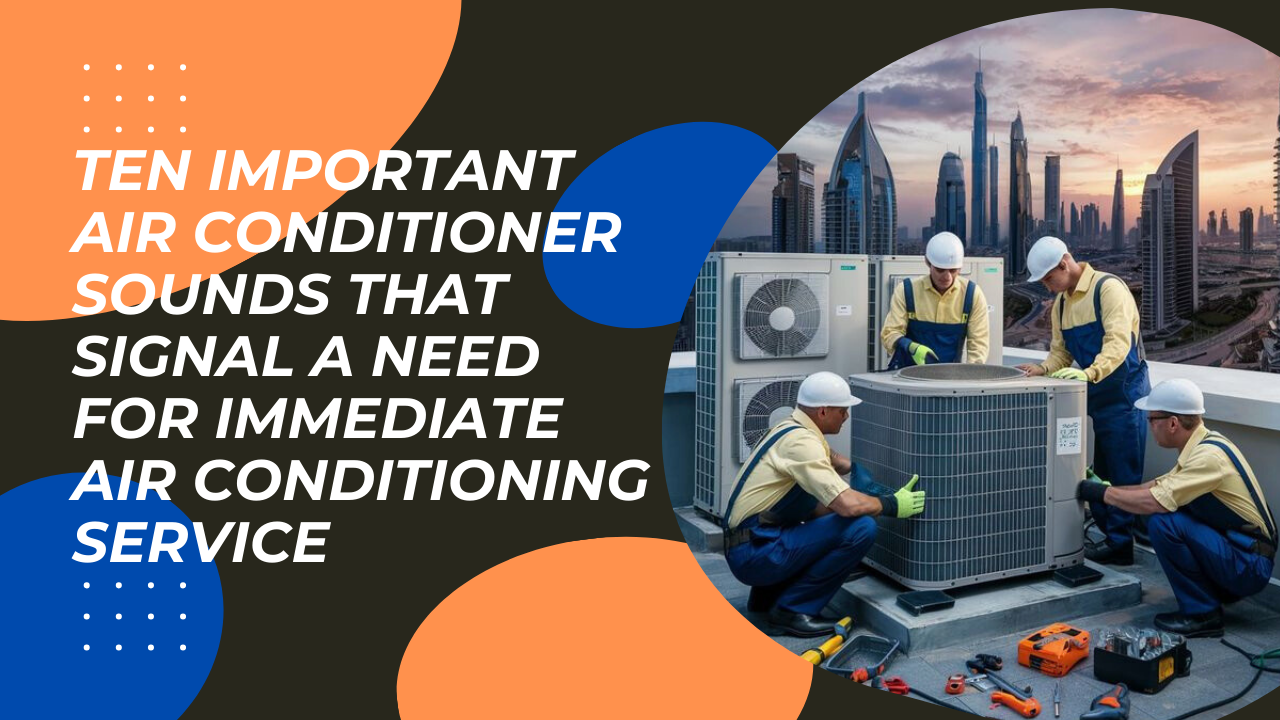Do you think your air conditioner might be having issues? While air conditioners can create noise during normal operation, most contemporary models are built with minimal to no noise generation. When using your air conditioner, you may require quick air conditioning service if you hear a strange or unfamiliar sound.
Even if troubleshooting appears to have fixed your air conditioner's problems, any noises that it now makes that weren't there before need to be fixed by a qualified technician for safety reasons. Rapid response to an air conditioner's noise is also likely to be avoided.
Furthermore, correcting an air conditioner's noise right away may avoid the air conditioner from completely failing. Early expert intervention will lower expenditures and allow you to use your air conditioner without being bothered by noise.
Noises from the Air Conditioner You Shouldn't Overlook
- Loud Banging Noise
A few potential causes of a loud banging sound coming from your air conditioner. Fan obstruction is one of the less serious causes, but if the fan is tightened in place and unobstructed, the compressor is probably the issue. Unfastened compressor components smacking against the compressor's outer framing cause a banging sound. In addition to distributing the cool air (refrigerant) around your house, the air conditioner's compressor also manages all other components. Since replacement needs several parts and electrical repair skills, it is recommended to have a competent technician fix a compressor.
- Screeching Sound
If your air conditioner is screeching, the compressor's pressure is probably a problem. In an air con compressor, a screeching sound happens when the pressure rises too much. After turning on your air conditioner will probably last for 10 to 15 seconds, during which time your air conditioning system may start and stop more frequently than usual. High pressure can be highly dangerous; thus, you should check your air conditioner immediately and call a technician to examine it.
- Buzzing Sound
Turn off your air conditioner at the isolator switch immediately if you hear buzzing. The buzz could indicate an electrical discharge caused by frayed or damaged wire, which poses a major safety risk and could start a fire. Once the air conditioner has been turned off at the isolator, request a qualified technician.
- Humming Noise
The contactor relay switch is most likely to blame for an air conditioner buzzing. You must turn off your ac unit at the isolator until a specialist can swiftly inspect and fix it because it is the result of a faulty electrical component.
- Rattling Sound
If your air conditioner is rattling, there may be loose objects (such as sticks, leaves, or dirt clumps) in the outdoor condenser unit. Alternately, a faulty electrical contractor may cause the air conditioner to make noise. Turn off the ac at the isolator if you can, then safely remove the obtrusive objects. To avoid harming the compressor, call an air conditioning professional immediately if you cannot remove any foreign objects or if there are none.
- Clanging Sound
An air conditioner creating a clanging noise is probably a problem, just like pounding or rattling noises. That is, either the fan or the condenser unit is being obstructed. Either way, you must avoid using your air conditioning system while banging until a specialist has looked at it.
- Pulsating Noise
As part of their routine operation, air conditioners occasionally produce a pulsating sound. If your air conditioner is now generating a pulsating noise that wasn't there before, a fan blade or motor inside the device may have come loose.
- Hissing Noise
Two potential sources of the hissing sound are coming from your air conditioner. The air filter or expansion valve may be broken. Alternately, an air duct leak might exist. You must immediately call a qualified specialist to remedy the problem because the leak could range from mild to severe.
- Whirring Noise
Suppose your air conditioner is whining (like a chopper). There is probably a mechanical fault with the internal blower or outdoor unit. A whirring sound could be produced when a belt or the fan motor loosens or breaks. It is recommended to call an HVAC specialist if there is no evident impediment (such as a piece of debris caught in the fan).
- Squealing Noise
There is a significant probability of a problem with the indoor blower motors, outside fan motors, or blower wheel and housing if your air conditioner is screeching. While some appliances scream when they first start up, it is advised to call for assistance if the sound is new.
